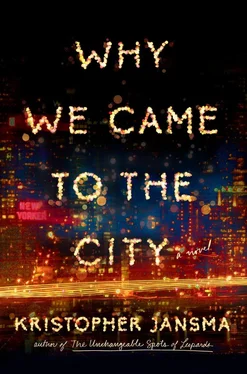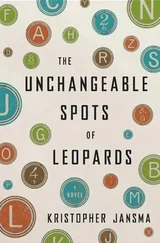He’d wanted to say, Look, if you were in my shoes, you’d try anything too. What’s $239.57 in exchange for Irene’s life? What’s a hundred or a thousand times as much? Is there any amount I shouldn’t spend? What he’d actually said was, “It’s for a paper I’m writing.”
Irene bent over and helped George pick the books up. She could grab only one at a time, using both hands. “You’re so funny asking me not to tell Sara about your little flip-out. Like you won’t tell her yourself the second she gets you alone.”
George knew she was right.
When the books were all gathered, they slowly made their way to William’s apartment.
“I’m going to haunt your wedding, you know that,” Irene said.
“Come on, don’t joke about that,” George said.
“I’m not joking!” she said. “You can count on it, buster. I’m going to be up there hurling rice in the air whether you like it or not.”
“I think Sara wants rose petals.”
“She would.”
“Rice is bad for the pigeons!”
“They have this pigeon-safe kind now.”
“Pigeon-safe rice.” George hummed to himself. “So glad someone spent time on that.”
They kept talking as they rode the elevator up together, heavy stacks of useless books crooked under each arm, a half-empty bottle of green sludge sticking up above the mother-of-pearl handle of Irene’s purse.
Sara must have heard them from all the way down the hall, because she flung the door to William’s apartment open before they could even knock at it. “Where have you been ?”
“We were waylaid by violent criminals!” Irene announced as she tottered in, transferring the armful of books into Sara’s hands. She made a beeline for William’s wide, white couch — where he and Jacob were drinking cocktails. “George had to beat them off with his fists!”
“Ha ha ,” Sara said flatly, as George planted a kiss on her cheek. He moved past her and dropped his armfuls of books onto William’s end table.
“You are in serious trouble, mister!” Jacob shouted.
“For buying a bunch of nonsense books?” William asked, studying the titles.
“Fuck that. I mean he’s in big trouble with me !”
George gave him a puzzled look, as he turned to Sara for explanation. “What’s he—? Why’s everyone drinking?”
Sara’s eyes were brimming, and she was smiling widely. George was sure there must be some great news from Dr. Zarrani about Irene. After all this! After his panic attack at the bookstore, and his revelation, and his thunderstorm in the subway… but this was it! The sign he’d been waiting for! And now Irene was going to be fine . George felt a swell of gratitude in his chest; he would never, ever doubt again.
“Dr. mmmm and Dr. hmmmm called,” she was saying. “They tried your cell and your office. They got Allen, and when they told him the news, Allen gave them my number, and they called me, thinking it might be our home number.”
“Why… wait, why would the hospital tell Allen anything?”
Sara was confused. “Drs. McManus and Schwartz. From Harvard.”
“WHICH IS IN FUCKING BOSTON IN CASE YOU FORGOT!” Jacob bellowed.
“Hush,” Irene said, nuzzling her head into the itchy fabric of his tweed coat.
George still didn’t understand. “What?”
“The lectureship,” Sara said, beaming proudly. “They’re offering you the job.”
George didn’t know if he ought to cry or faint or cheer. He settled on an extremely awkward mix of all four reactions, which sounded — Jacob would later tell him — like a dolphin choking on an orange. Then Sara was hugging him, and Irene was clapping as hard as she could — which wasn’t hard — and William was heading over from the couch with his hand outstretched. In an instant, George forgot all about the subway ride and Mrs. Cho and the $239.56 and the books. He forgot who he was and where he came from.
“Cheers!” William raised his glass. “To Professor Murphy!”
George lifted his left hand instinctively — his hand knew what it was holding before his brain did. Before he could quite stop himself, George clinked the glass against William’s and raised it to his lips. He took a deep gulp and swallowed. It burned every inch of the way down.
NOVEMBER
Irene liked that Dr. Zarrani delivered the bad news herself. For the first time in months, it was just the two of them sitting together again, no nurses popping in and out, and no friends hovering in the hallway. Irene was lying in a hospital bed, tubes running out of her arms and legs and torso. Only the IV machine made noise, beeping like a metronome on the stand. Dr. Zarrani had walked in looking tough, but barely a moment into the discussion, she’d had to sit down in the pink reclining chair in the corner. Irene appreciated this. What could be kinder, really, under the falling shadow of devastation, than for someone to pull up a chair?
The experimental treatment was having some impact, but only enough to stop the progress of the cancer. Upping the dosage might lead to some gains, but Irene was too weak to survive the side effects of such an increase, even with 24/7 care. Dr. Zarrani explained that this put them in a no-win situation. Either the cancer would kill her, or the treatment would.
Irene knew she was right. Already, she needed help getting in and out of the gigantic hospital bed. Her arms were as long and thin as kitchen tongs. Her hair was like pillow stuffing. The sores in her mouth and throat stung even through the perpetual morphine haze. Her body’s natural defense for this was to generate biblical floods of mucus, which Irene had to spit into a beige plastic tub every two or three minutes. Nurses had to wake her every thirty minutes so she wouldn’t choke in her sleep.
Meanwhile Irene could feel tumors everywhere now — bumps on her legs and shoulders, one behind her ear. The ones on her bones were weakening her skeleton such that a simple trip to the bathroom was alleged to be a grave risk for shattering a femur or a foot. There were others in places she couldn’t feel, but the CAT scans could see them: one in her kidney, one in her small intestine, and worst of all, one the size of a baseball in her left lung, which made it hard to take a deep breath. They had her on an oxygen tank most of the time. All of this, in just under a month.
Dr. Zarrani went on to explain a few more details, but Irene wasn’t really listening. She was watching as the woman raised her hands to support her heavy head. She was watching Dr. Zarrani begin to cry. She’d never done this before. The quickening of breath. The flush of cheeks. The shaking of jaw, and the slow filling up of the corners of each eye until, with a bursting, the drops couldn’t hang there anymore. Each tear seemed to inspire ten more. Soon the doctor was weeping, full on.
“Shush,” Irene said. “It’s okay. Really. It’s okay.”
“You’re smiling,” Dr. Zarrani said after a minute. Mascara shot down like dark lightning from both her eyes.
“I’m glad you’re crying,” Irene said. “I’m glad — I don’t know why I’m glad about that.”
“Nothing wrong with crying,” Dr. Zarrani sniffed, wiping her cheeks with tissues from Irene’s bedside. The mascara came off in long, gorgeous smudges.
Neither of them said anything for a few minutes, and then finally Irene said, “Is it — is it weird that I’m kind of relieved? Like, just to know. You know?”
Dr. Zarrani shook her head. “You’ve been in a lot of pain for a long time. It’s natural to feel relief.”
Irene looked up at the cracked ceiling. “Should’ve run away when I had the chance.”
“We’d like to get you well enough to go home for a little while before — well, before.”
Читать дальше












